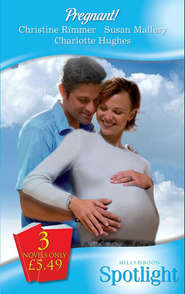По всем вопросам обращайтесь на: info@litportal.ru
(©) 2003-2025.
✖
Donovan's Child
Автор
Год написания книги
2019
Настройки чтения
Размер шрифта
Высота строк
Поля
“Planned or not, you’re the one who kept us from going ahead months ago.”
“Since you seem to be so fond of clichés, here’s one for you. Can we stop beating the same dead horse? Yes, I put the project on hold. Now I’m ready to get down to work.”
“And the timeline is impossibly tight.”
“That may be so.”
“How generous of you to admit it.”
“But in the end, Abilene, there is only one question.”
“Enlighten me.”
“Do you want to make a success of this or not?”
Okay. He had it right for once. That was the question. “Yes, Donovan. I do.”
“Then go back to your work area, get out your pastels, your charcoal, your fat markers. And stop fooling around.”
Chapter Four
From that moment on, for Abilene, work trumped everything else. From nine—sometimes eight—in the morning, until after seven at night. Donovan supervised. He guided and challenged her. But he fully expected her to carry most of the load.
It would be her project in the truest sense. Which made it the chance of a lifetime for her, professionally. And also absolutely terrifying.
She drove herself tirelessly and mostly managed to keep her fear that she might fail at bay.
Donovan was not always there in the studio with her. He would set her a task or a problem to solve and then disappear, only to return hours later to check on her progress, to prod her onward.
Often during the day, when he wasn’t with her, he took his personal elevator down to his underground gym to work with one of his physical therapists. Now and then, she would see them, Donovan’s trainers. And the massage therapists, too. They were healthy, muscular types, both men and women. They came and went by the kitchen door. Anton, the cook, who was big and barrel-chested with a booming laugh and long gray hair clubbed back in a ponytail, would sometimes feed them after they finished putting Donovan through his paces.
Donovan seemed dedicated to that, at least, to taking care of his body, to making it stronger—though he continued to do nothing to heal his damaged spirit.
Or, apparently, his broken relationships. As had happened the first night, people Abilene never saw showed up at the front door to ask to speak with him. Olga or Ben always answered the doorbell when it rang. And they always sent whoever it was away.
More and more as the days went by, Abilene found herself wondering about that. About the people who cared for Donovan, the people he kept turning his back on. She would wonder—and then she would catch herself.
Really, it wasn’t her concern if he refused to see former friends. She didn’t even like him. Why should she keep wondering what had happened to him? Why couldn’t she stop puzzling over what could have made him turn his back on other people, on a fabulous career?
There was the climbing accident, of course. That seemed the most likely answer to the question of what had killed his will to work, to fully engage in his own life. It seemed to her that something must have happened, some thing that had changed him so completely from the out going, inspiring man she’d admired from a distance back in college into someone entirely different.
She found she was constantly reminding herself that she was there to work, not to wonder what in the world had happened to Donovan McRae. She told herself to focus on the positive. If she could pull this off, create a design that would wow the Foundation people and hold her own overseeing construction, her career would be made.
And there were some benefits to being stuck in the desert with Donovan—Olga, for one.
The housekeeper was helpful and pleasant and ran the big house with seeming effortlessness. And beyond Olga, there was Anton’s cooking; every meal was delicious and nourishing. And the conversation at dinner, while not always pleasant, did challenge her. Donovan might not be a very nice man, but he was certainly interesting. Ben provided a little balance, with his dry wit, his warm laughter.
Abilene really did like Ben. As the days passed, the two of them became friends. Every night, he came to her rooms for an hour or two before bedtime. Often, he brought dessert. They would eat the sweet treat, and he would commiserate with her over Donovan’s most recent cruelties.
And beyond the great food, the comfortable house, the very efficient Olga and Abilene’s friendship with Ben, there was music. Anton played the piano, and beautifully. Sometimes after dinner, in the music room at the east end of the house, he would play for them. Everything from Chopin to Gershwin, from Ray Charles to Norah Jones.
One night, about two weeks into her stay in Donovan’s house, Anton played a long set of Elton John songs—songs that had been popular when Abilene’s parents were young. Anton sang them, beautifully, in a smoky baritone, and Olga, who had a good contralto voice, sang harmony. Abilene felt the tears welling when they sang “Candle in the Wind.”
She turned away, hoping Donovan wouldn’t notice and torment her about it.
But it was never a good bet, to hope that Donovan wouldn’t notice.
When the last notes died away, he went for the throat. “Abilene. Are you crying?”
She blinked the dampness away, drew her shoulders back and turned to him. “Of course not.”
“Liar.” He held her gaze. His was blue and cool and distant as the desert sky on a winter afternoon. “Your eyes are wet.”
She sniffed. “Allergies.”
He refused to look away. She felt herself held, pinned, beneath his uncompromising stare. She also found herself thinking how good-looking he was. How compelling. And how totally infuriating. “It’s winter in the desert,” he said. “Nobody has allergies now. You’re crying. You protect yourself by pretending to be cool and sophisticated. But in your heart, you’re a complete sentimentalist, a big bowl of emotional mush.”
It occurred to her right then that he was right. And she wasn’t the least ashamed of it. “Okay, Donovan. I plead guilty. I am sentimental. And really, what is so wrong with that?”
“Sentimentality is cheap.”
Ben, sitting beside her, shifted tightly in his chair. “Cut it out, Donovan.”
“Ben.” She reached over and clasped his arm. “It’s okay.”
He searched her face. “You’re sure?”
“I am positive.” She turned her gaze on Donovan. “A lot of things are cheap. Laughter. Honest tears. Good times with good friends. A mother’s love. A baby can have that love by the mere fact of its existence. Of its very vulnerability, its need for affection and care. Cheap is not always a bad thing—and I’ll bet that when you were a child, you used to pull the wings off of butterflies.” She regretted the dig as soon as it was out. It wasn’t true and she knew it. Whatever had shriveled his spirit had happened much more recently than his childhood.
He totally surprised her by responding mildly. “I was a very nice little boy, actually. Sweet-natured. Gentle. Curious.”
The question was there, the one that kept eating at her. She framed it in words. “So then, what is it, exactly, that’s turned you into such a bitter, angry man?”
He didn’t answer. But he did look away, at last.
And for the rest of the evening, he was quiet. The few times he did speak, he was surprisingly subdued about it, almost benign.
Ben brought her red velvet cake that night. “I figured you deserved it, after that dustup in the music room.”
“It wasn’t so bad, really. I shouldn’t have said that about him torturing butterflies.”
“It got him to back off, didn’t it?”
“Yeah. But …”
“What?”
“I don’t know. Sometimes, in the past few days especially, I don’t feel angry with him at all. I only feel sorry for him.”











